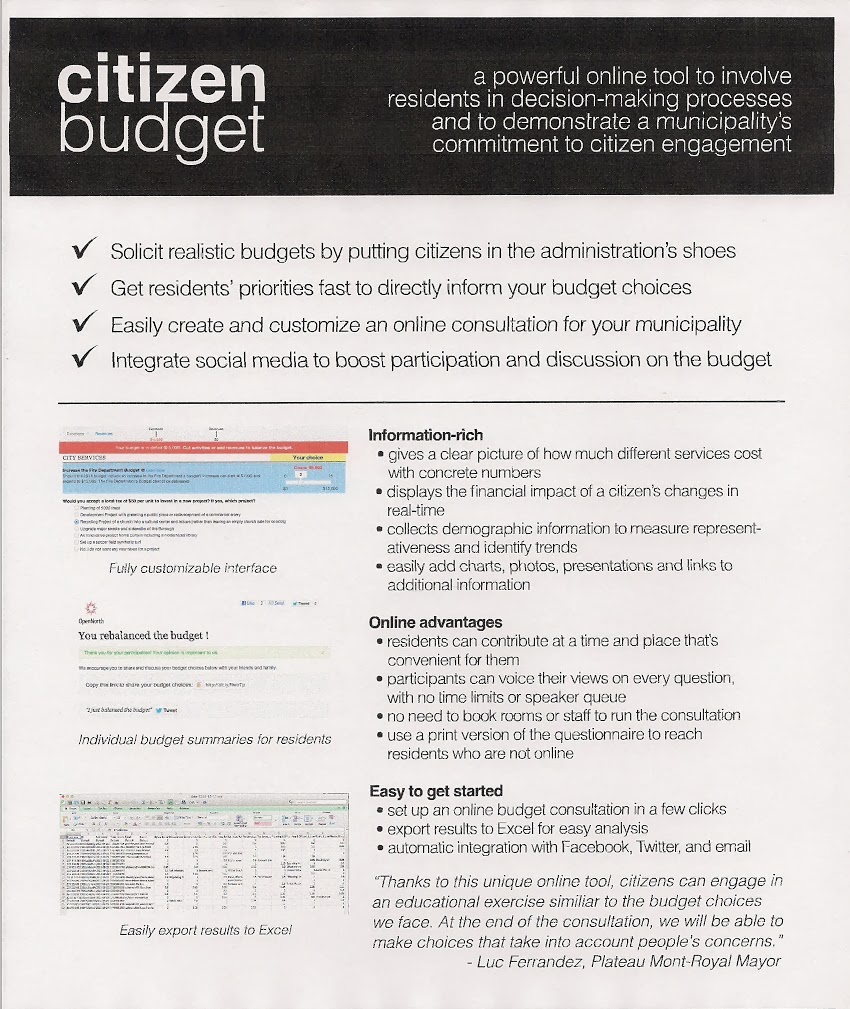 |
| Citizen Budget: Tri-City News left the impression I oppose it. |
First, some background. You've all heard public figures complain about inaccurate and out-of-context reporting. It's a staple of political theatre.
And I must admit that, having spent more than three decades as a full-time journalist, I've been the target of some of those complaints--even, on rare occasions, justifiably.
But in my two-plus years as a Coquitlam City Councillor, I haven't had much reason to do any complaining myself. For the most part, the reporting of my activities on Council has been both fair and accurate, albeit never as thorough as I would like.
On this latter subject, now that I'm on the "inside," it often pains me to see how a complex subject, such as a neighbourhood plan or a new strategy of some sort, that council has spent several hours discussing and on which staff has clearly spent many dozens or even hundreds of hours working, is boiled down to eight-to-ten paragraphs by a reporter.
Nevertheless, when the boiling-down captures the essence of both the content of the report and the discussion around it, there's really not much to gripe about.
That said, I must now declare that the top story on the front page of the Feb. 21 issue of the Tri-City News has somewhat misrepresented my position on a bold, new public-opinion-gathering exercise that the City will likely adopt in the next round of budget consultations.
My colleagues and I on Council discussed the Citizen Budget initiative at the Feb. 19 meeting of the Finance Standing Committee. The initiative would allow interested citizens to express their opinions about such budget-related issues as revenue and expenses, and programs and personnel by way of an interactive, easy-to-understand website.
Now, those of you who have been following my political career to date will know that I have been a big supporter of new ways to engage citizens. In fact, it was my initiative that led to Coquitlam holding its first-ever E-Town Hall meeting.
Understandably, then, I'm a big supporter of the Citizen Budget initiative, and said so in my presentation at Committee. However, I also pointed out that the on-line opinion-gathering apparatus would be just one way that Councillors could and should gather information; others include our own research, face-to-face interactions with the community and the annual Ipsos Reid poll.
And on the subject of polls, I noted that, unlike the Ipsos Reid one, the on-line initiative would not be scientific, and so its results would have to be taken with a grain of salt.
Ultimately, though, I opined that the Citizen Budget initiative would be beneficial, not only for its ability to sample public opinion and obtain more budget feedback, but also for the very fact that it sends the message to all residents that the City really does care what they think.
After all that, however, Tri-City News lumped me in with "a few Coquitlam councillors [who] voiced concerns about the program's lack of controls," reporting that, "Coun. Terry O'Neill said while the Citizen Budget could capture the mood of Coquitlam's 139,000 residents, 'this has to be taken with a grain of salt' as the results aren't as scientific as those from the Ipsos Reid poll." (The story does not appear to be posted online yet.)
True enough, as far as it goes. But, of course, the problem is that story doesn't go nearly far enough, in that it leaves the impression I am opposed to the plan when, in fact, the exact opposite is true.
And there you have it. It's more of an exasperated quibble than an angry complaint. But, on a subject (voter and citizen engagement) on which I have devoted so much attention, it's important that the complete story be told.

